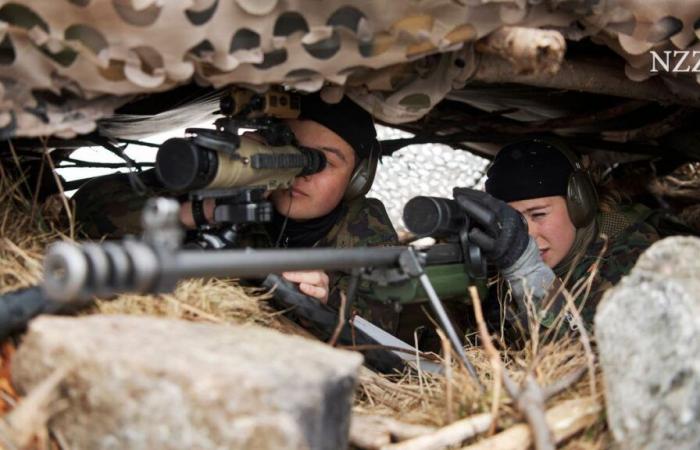Sexist comments, jokes, inappropriate gestures: a study reveals grievances in the Swiss army. Carmen Affentranger is president of a network for women in the military. A conversation about the disastrous current situation. And about what needs to change.
Two female soldiers during an exercise at the Hinterrhein firing range.
Karin Hofer / NZZ
The Swiss army has a massive problem with discrimination and sexual violence. According to a study by the Office for Women in the Army and Diversity, 86 percent of all women surveyed have experienced some form of sexism while serving in the military. Homosexual men also have this experience. It involves sexist comments or jokes, inappropriate staring, lewd gestures or unwanted sexual acts. Every second woman in the army has been a victim of sexual violence.
Carmen Affentranger is 27 years old and the president of the “Women in Camouflage Suit” (FiT) association. She founded the association together with other female soldiers in 2019 with the aim of networking women in military service. The association has been calling for sexual violence in the army to be addressed since 2021.
Carmen Affentranger, sexism everywhere: What’s wrong with the Swiss army?
The army is historically very male-dominated and hierarchically structured. Strict hierarchies encourage such developments. In a hierarchical system, as an individual you are heavily dependent on your superior. People would rather remain silent than speak up. This is also because there is a clear idea of how people should behave in the army and how they should treat each other. This system has hardly had to change so far.
Were you surprised by the results of the study?
Carmen Affentranger, President of the “Women in Camouflage Suit” (FiT) association.
PD
When I talk to other women in the army, I always notice the same thing: there is a mutual understanding because all women know these problems and have experienced discrimination or sexual violence. This is true for every military woman I know.
How did your comrades react to the results of the study?
Many are happy that there are now facts that clearly prove that this problem exists. This brings with it the hope that something will change.
Army chief Thomas Süssli said at the media conference yesterday: “I didn’t expect the extent of it.” – How can it be that the head of the army does not know what is happening in the barracks?
I think Army Chief Süssli certainly knew that this problem existed. Maybe he underestimated it. The higher up someone is in the hierarchy, the less they are aware of what is going on in the troops. This also has to do with the fact that those affected fear risking their careers if they criticize. In addition, it is difficult for many people to understand what sexual violence is.
What do you mean?
There are clear physical attacks, that’s one thing. But there are also derogatory sayings. Those who say these things may not even be aware of how it feels for a woman. A journalist from the magazine “Swiss Soldier” reported to the media conference on the study. He said that during his time in the military there were many situations that were problematic. But he wonders where to draw the line now. What are you allowed to do? And what not? That’s exactly what we need. We need to talk about sexist jokes and comments and discuss what works – and what doesn’t.
Can you give an example of these nuances?
Suppose a group of comrades are sitting at a table and derogatory jokes about women are being told. In such a situation, I feel overlooked as a woman. Should I laugh along? Moments like this make me feel like I don’t really belong to the group. Anyone who has never been in a room and belonged to a minority will probably have trouble understanding this.
You are in the army yourself. Have you experienced sexist comments or unwanted sexual acts yourself?
I don’t feel comfortable giving examples now. As soon as I did that, people might rub against it and say: It’s not that bad, don’t feel like that. But yes: I have experienced unpleasant situations.
Do you have the impression that the army has taken reports from those affected seriously so far?
Many officers, i.e. the superiors, are militia members. This means that they perform this function for four weeks a year. The rest of the time they are in their normal job. It is completely natural that they have less capacity and experience in dealing with these situations. This is also why it is important that there is now an independent reporting office. Above all, the reporting office signals to those affected that they are being taken seriously and are in a trustworthy environment.
So far, everything has been done through normal official channels.
Yes, that was problematic because you had to fear that a report would have negative consequences for yourself. The independent reporting center has now been in existence for a year and a half. And you can contact the psychological-educational service or a pastor. Such opportunities are extremely important.
Army chief Süssli sees the solution in diverse, diverse teams. By 2030 he wants to increase the proportion of women from less than 2 percent to 10 percent. But there is a lack of infrastructure and equipment for women.
First, the Army needs a culture change. Everyone has the responsibility to treat their comrades with respect. I would also like to see leaders serve as role models in this development. It takes both: a cultural change from above and from below. But shifting all responsibility onto the troops is wrong. After all, we are talking about a structural problem.
The specialist body that published the study also presented measures. Many aim for women to take responsibility themselves. For example, by asking them to report if they experience something offensive. Shouldn’t we start with men?
I think it’s important that everyone takes responsibility. It shouldn’t be the case that only women say something. This also paints a false picture of the problem. Especially if you are a victim of sexual harassment, you may find yourself unable to defend yourself. Then you need help from others. At the moment in the army there are a lot of people watching. I have many comrades who are dissatisfied with the situation. They don’t want things like this to happen. Nevertheless, they don’t intervene when something happens. We all have to learn to say something. But you have to have the courage. And depending on the group dynamics, this can be very difficult.
How do you break such a dynamic?
The army leadership must make it clear that it will not tolerate this behavior. And every level of the hierarchy must then support this attitude. Managers have to motivate their people to take action. It probably also helps if you talk about it more and make people more aware.
At SRF, a female soldier said that as a woman in the army you need “thick skin”. Does that mean women have to adapt to men?
Even before I started recruit school, people warned me about male manners. Other women said that as a woman you shouldn’t be sensitive and sensitive in the army. For some women, adaptation is a survival strategy. And they pass on this belief later. In addition, women are spoken very badly about in the army. I hear so many stories. And sometimes I think: Am I really the only normal woman here? But of course that’s not true. I know so many wonderful and dedicated women who serve in the Army.
Are you worried that the current study will deter young women from serving in the army?
Perhaps. However, the few women who actually join the army put a lot of thought into it before they join. It is already clear to all women today that sexist comments or harassment can be a reality. And they go anyway.
What would you say to a young woman on orientation day?
I would show her what it means to join the army. I also asked myself at the time: What would happen if I joined the army? Will I be excluded? Will bad things happen to me? Then I decided to give it a go.
Do you regret your decision to join the army?
I don’t regret the decision. The painful experiences also helped me move forward. But I’m less motivated than when I started. That has a lot to do with the grievances. It’s exhausting to endure these things and sometimes I wonder why I do this to myself.






